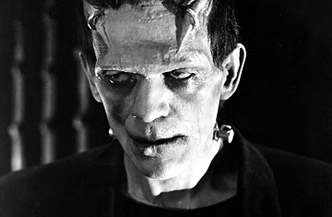Classic Movie Review:
Frankenstein
By Josh Spiegel
November 3, 2010
BoxOfficeProphets.com

But I’m not reviewing The Shining today (if that wasn’t obvious). I bring the film and the criticism up - the essential lack of a first act in The Shining - to shine a bit of light on this week’s classic movie, the 1931 horror movie Frankenstein. As a child of the end of the 20th century, my familiarity with the Frankenstein series begins and ends with the Mel Brooks comic classic Young Frankenstein. Unrelated note, but still worth pointing out: if you have the opportunity to see the musical version of this film as it tours the country, take my advice and do not see the show. It’s a sad truth, but Mel Brooks should probably just leave well enough alone and not even think about doing a musical based on Blazing Saddles.
Anyway, to Frankenstein. Based on the iconic novel by Mary Shelley, Frankenstein is a horror film about a scientist who goes nearly insane in the process of reanimating a dead human body. Of course, as I’m sure we all know, the body does become alive once again but due to its brain, the scientist brings to life a hideous monster. Frankenstein, as directed by James Whale (his own story made into a film, Gods and Monsters, starring Ian McKellen), is a fitfully frightening, sometimes truly arresting, but somewhat surprisingly disappointing film. Yeah, I know; yet another classic movie that I can’t fully get behind. Yet, one of the big reasons why the film threw me for a loop is simple: it’s missing its first act. I would have liked to know what made Dr. Frankenstein so intent, so determined to reanimate dead tissue.
Instead, we pick up with Dr. Frankenstein completely over the bend. The film opens with the end of a funeral, being spied on by Frankenstein and his bug-eyed, humped assistant Fritz (Dwight Frye, continuing to impress as the creepiest actor of his time; he was formerly Renfield in Dracula). There’s no question from the very first shot of Frankenstein that he’s not a man to be trifled with, and he’s got a few screws loose. What, then, are we supposed to make of a 70-minute horror movie - like Dracula, this movie knows not to linger - where the title character starts out insane and ends up as a heroic leading man? Yes, by the time the movie ends, not only is Dr. Frankenstein still alive, though wounded, but he’s been…cured of his insanity.
Mind you, he’s not actually cured. Nothing major happens to make Dr. Frankenstein realize that his attempt to bring the dead back to life was folly. What happens is that his experiment works with a criminal brain, so he’s cowed into appreciating that…I don’t know, he should get a new assistant who isn’t freaked out by loud noises? There are unquestionably elements of this film that work like gangbusters, though, and let’s get to the top of that list with the obvious choice. Boris Karloff. This is a name well-known throughout cinema history, and it all begins with his performance as Frankenstein’s monster. As this movie is only 70 minutes long, it takes nearly half of the film for the monster to even appear. When Karloff appears, lumbering toward the screen in silhouette, then in a shocking close-up, it’s truly galvanizing.
Of course, unlike Peter Boyle in Young Frankenstein, Karloff has to work without dialogue. Aside from some grunting, high- or low-pitched, Karloff barely makes a sound in the film. His immense figure, larger-than-life head, and sunken eyes make the character so memorable. What’s frustrating about the way the film plays is that, almost from the get-go, you feel for this creature, this monster. Afterwards, though, the story - if not the direction - makes us think that, no, we shouldn’t feel bad for this guy. I mean, he’s throwing a little girl into a lake and letting her drown! Of course, that action is reprehensible, but we understand the methodology behind it. The monster’s mind, while criminal, is child-like. His fear of fire, his thrill at the sun hitting his face…how can I not feel bad for him?
No, the movie tells us, I’m supposed to feel bad for Frankenstein, his fiancée Elizabeth, his mentor Dr. Waldman, and a fellow scientist. Why? Because they’re civilized humans, of course. Unfortunately, the scenes surrounding these characters are the weakest in the film. The lengthy climax, for example, begins with a wedding ceremony gone awry, and the only actually compelling element comes when the father of the girl who’s thrown in the lake carries her dead body through the celebration in an agonizingly long tracking shot. Of course, sympathizing with the human characters isn’t a problem; my issue is that we’re told to sympathize with a man who brings a monster into the world, realizes what he’s done, and then attempts to destroy it as viciously as he brought it in. I have sympathy for movie characters, and I’m OK with complex antiheroes, but I genuinely don’t know what to think of this guy.
Frankenstein is a visually appealing film, and Whale clearly likes to move his camera around the ornately designed sets. The performers are all fine; I believed Colin Clive, as Frankenstein, being insane as much as I tried to believe him being something of a reformed man. Whatever faults this film has lie almost totally with its script, which vacillates between making the monster a relatively sympathy-deserving figure and making the monster…well, a monster. It’s not even that having characters change allegiances is bad; it’s that the movie just about drops us in the middle of the story, and hopes we’ll just know who to side with. Karloff is excellent, the visuals are wildly impressive for the time, and there are moments of genuine horror and tension here. But the movie is a classic for its moments, not its whole.